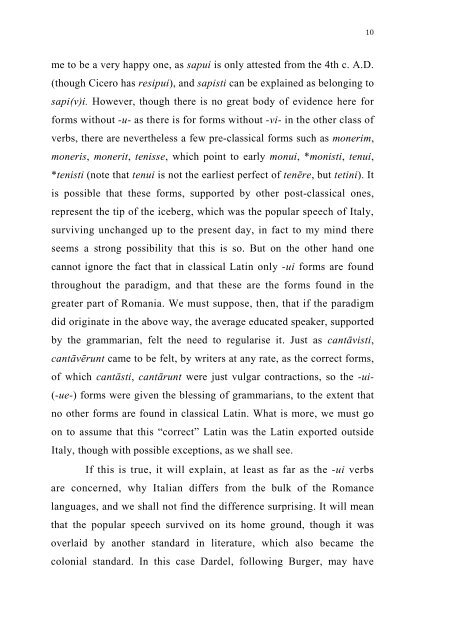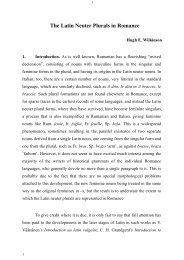THE STRONG PERFECTS IN THE ROMANCE ... - Page ON
THE STRONG PERFECTS IN THE ROMANCE ... - Page ON
THE STRONG PERFECTS IN THE ROMANCE ... - Page ON
Create successful ePaper yourself
Turn your PDF publications into a flip-book with our unique Google optimized e-Paper software.
me to be a very happy one, as sapui is only attested from the 4th c. A.D.<br />
(though Cicero has resipui), and sapisti can be explained as belonging to<br />
sapi(v)i. However, though there is no great body of evidence here for<br />
forms without -u- as there is for forms without -vi- in the other class of<br />
verbs, there are nevertheless a few pre-classical forms such as monerim,<br />
moneris, monerit, tenisse, which point to early monui, *monisti, tenui,<br />
*tenisti (note that tenui is not the earliest perfect of tenēre, but tetini). It<br />
is possible that these forms, supported by other post-classical ones,<br />
represent the tip of the iceberg, which was the popular speech of Italy,<br />
surviving unchanged up to the present day, in fact to my mind there<br />
seems a strong possibility that this is so. But on the other hand one<br />
cannot ignore the fact that in classical Latin only -ui forms are found<br />
throughout the paradigm, and that these are the forms found in the<br />
greater part of Romania. We must suppose, then, that if the paradigm<br />
did originate in the above way, the average educated speaker, supported<br />
by the grammarian, felt the need to regularise it. Just as cantāvisti,<br />
cantāvērunt came to be felt, by writers at any rate, as the correct forms,<br />
of which cantāsti, cantārunt were just vulgar contractions, so the -ui-<br />
(-ue-) forms were given the blessing of grammarians, to the extent that<br />
no other forms are found in classical Latin. What is more, we must go<br />
on to assume that this “correct” Latin was the Latin exported outside<br />
Italy, though with possible exceptions, as we shall see.<br />
If this is true, it will explain, at least as far as the -ui verbs<br />
are concerned, why Italian differs from the bulk of the Romance<br />
languages, and we shall not find the difference surprising. It will mean<br />
that the popular speech survived on its home ground, though it was<br />
overlaid by another standard in literature, which also became the<br />
colonial standard. In this case Dardel, following Burger, may have<br />
10









